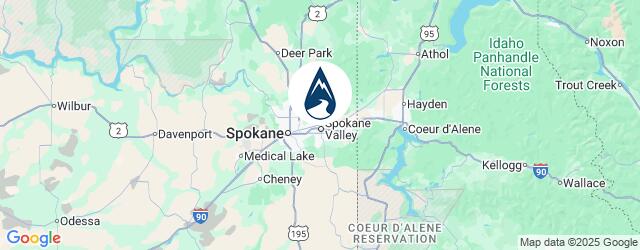The Importance of Regular Water Testing in Spokane and Coeur d’Alene
Your water is something you likely consume every single day, yet most Spokane homeowners have no idea what’s actually in it. From invisible contaminants to naturally occurring minerals, what flows from your tap tells a story about your home’s health and safety.
Let’s explore when testing your water makes most sense, what to test for, and how to address any issues that might be lurking in your water supply.
Water Quality Basics in the Inland Northwest
If you’re wondering if you need a water test, the answer depends on your water source and specific concerns about water quality. Most homes in our region receive water from either the Spokane Valley-Rathdrum Prairie Aquifer (for city water) or from private wells that tap into this same groundwater system.
The Inland Northwest’s water sources are generally high quality, but they’re not immune to contamination. City water undergoes regular testing and treatment, while private well owners are responsible for their own water quality monitoring.
Our local geography creates unique water conditions that may require testing. The porous nature of our aquifer means contaminants can sometimes travel quickly through groundwater, especially during spring runoff seasons.
Common Contaminants in Regional Water
Several contaminants may be present in Spokane and Coeur d’Alene water systems:
- PFAS: These “forever chemicals” have been detected in some local water supplies and can cause health issues with long-term exposure
- Lead: Homes built before 1986 may have lead pipes or solder that can leach into drinking water
- Nitrates: Agricultural runoff and septic systems can introduce nitrates into groundwater
- Coliform bacteria: These microorganisms indicate possible contamination from human or animal waste
- Hard water minerals: Calcium and magnesium can cause scale buildup and affect appliance efficiency
Main Reasons to Schedule Regular Tests
Health protection is the primary reason to test your water. Certain contaminants can cause immediate illness while others may lead to long-term health effects if consumed regularly.
Compliance with regulations is essential for homeowners with private wells, especially during real estate transactions. Many mortgage lenders require water testing before approving loans.
Unusual taste, odor, or appearance in your water should prompt immediate testing. These sensory changes often signal water quality issues that need addressing.
Local environmental factors like nearby agricultural activities, mining operations, or industrial sites increase the importance of regular testing.
Best Timing for Testing
For private well owners in Spokane and Coeur d’Alene, annual testing is the minimum recommendation. This helps establish baseline water quality and track changes over time.
Seasonal testing provides more comprehensive information. Testing during spring runoff and during late summer low water periods gives you a complete picture of your water quality.
Additional testing is wise after:
- Major plumbing work or pipe replacements
- Flooding or heavy rainfall events
- Nearby construction or drilling
- Unexplained gastrointestinal illnesses
- Water that suddenly changes in taste, smell, or appearance
Practical Steps for Getting a Water Test
Finding a certified testing lab is your first step. The Spokane Regional Health District can provide recommendations for accredited laboratories in our area.
Proper sample collection is crucial for accurate results. Follow the lab’s specific instructions for using the correct sample containers and avoiding contamination during collection.
Basic water testing package costs vary depending on which contaminants you’re testing for. More comprehensive panels will be at the higher end of this range.
Homeowners should consider both basic and comprehensive testing options. Basic tests check for bacteria and nitrates, while comprehensive panels examine a wider range of contaminants.
Tackling Issues After a Bad Test Result
If your water test reveals problems, don’t panic. Most water quality issues have straightforward solutions that we can help implement.
For bacterial contamination, shock chlorination may be effective for private wells. This process disinfects the entire water system but requires precise application.
Filtration systems offer solutions for various contaminants:
- Carbon filters: Effective for chlorine, some pesticides, and odor issues
- Reverse osmosis: Provides comprehensive contaminant removal
- Water softeners: Addresses hard water minerals
- UV purification: Targets bacterial concerns
Professional consultation is recommended before installing any water treatment system. Our plumbing experts can help determine the most effective solution based on your specific test results.
Our Commitment to Your Home and Water Safety
At Comfort Heating, Cooling, Electrical & Plumbing, we understand that clean water is essential to your family’s health and comfort. Our team of licensed plumbers can help evaluate your water quality concerns and recommend appropriate testing or treatment options.
We’ve been serving Spokane and Coeur d’Alene families for many years, building trust through honest recommendations and quality workmanship. Our local expertise means we understand the specific water challenges faced by homeowners in our region.
Whether you need help interpreting test results, installing filtration systems, or addressing plumbing issues that might affect water quality, we’re here to help. Ready for extra peace of mind? Book a service appointment to chat with our team today.
For Spokane residents wondering if they need to test their water, area experts like our team can provide personalized guidance based on your specific situation. We consider factors like your water source, home age, and any symptoms you’ve noticed to recommend the right testing approach.
Hear From Our Happy Customers
Contact Quality Water Northwest Today!
We’re Ready to Help
A member of our team will be in touch shortly to confirm your contact details or address questions you may have.
"*" indicates required fields

- Coeur d'Alene
- Dalton Gardens
- Fairwood
- Glenrose
- Hayden
- Liberty Lake
- Millwood
- Post Falls
- Spokane
- Spokane Valley

